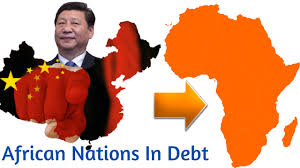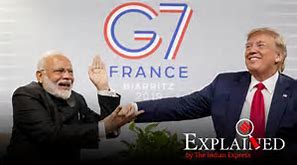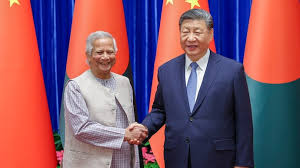China has either cancelled or shown willingness to cancel its loans when they are small and there is prospect of making up those losses in other bigger ways, or where there are larger geo-strategic and geo-economic interests involved and thus serving its BRI goals. It has not shown any interest to do so in cases where there are underlying faultlines in economic fundamentals making them of no value to its economy.
by Prasad Nallapati
Signs of frustration are increasingly felt in Sri Lanka as negotiations with China for its debt rescheduling are going nowhere and thus setting to miss the December deadline for an IMF loan approval. Colombo will have to complete negotiations with its creditors on restructuring of their debts before it gets final nod for IMF disbursement. Sri Lanka owed Chinese lenders US $7.4 billion, nearly a fifth of its public external debt amounting to US$ 37.6 billion as of the end of the last year.
Sri Lanka is in a similar position to that of Zambia, which owes China US $6 billion at the end of the last year. Beijing has not so far shown any hurry to oblige these two countries, as their cases are seen as of financial mismanagement and their value to China’s geo-economic and geo-strategic interests diminishing.
China’s debt restructuring talks with various African countries throw light on how Beijing goes about approaching the issue, case by case. Three such test cases can be discerned.
Zambia – A case of Financial Mismanagement and Diminishing Returns
Despite getting IMF’s initial approval for $1.3 billion loan in August to help restructure its debts, Zambia is still struggling to complete negotiations with China and other creditors for debt restructuring of nearly $ 15 billions of external debt due in next three months. Zambia defaulted on its sovereign debt in 2020. China, the largest bilateral creditor accounting for one-third of Zambia’s total debt, is in no hurry to reschedule repayments and sought clarifications from the Zambian government and the IMF on their debt agreement. China wanted more clarity on the IMF assumptions on which the loan programme is based since these are to form the basis of the restructuring negotiations between Zambia and all its creditors.
Djibouti – A case of Strategic Interest
Djibouti, the tiny nation in the Horn of Africa, on the other hand has suspended debt repayments to two of its main bilateral creditors, including China, as it is facing mounting financial pressures. It is confident that China and other nations would ultimately come around to negotiate a debt restructuring plan as Djibouti was geo-strategically important to these countries. With its strategic location in the Horn of Africa with easy access to the Red Sea, Gulf of Aden and the Indian Ocean, Djibouti is the gateway to the wider region of East Africa. It hosts China’s only overseas military base and thus attracting huge investments.
“China is by far the largest creditor to Djibouti – 65 per cent of Djibouti’s external debt payments in coming years are to China,” according to Tim Jones of the British-based charity Debut Justice. The World Bank’s latest report on Djibouti said the country’s external debt servicing costs tripled in 2022 – from US $54 million last year to US $ 184 million – and predicted a further increase to US $266 million next year.
Tim Zajontz, a research fellow at the Centre for International and Comparative Politics at South Africa’s Stellenbosch University, said “To maintain sound relations, it is possible that Beijing will accommodate the Djiboutian government with a debt restructuring plan as they previously did in the case of neighbouring Ethiopia.” In 2019, when Djibouti faced similar debt challenges, it reached a deal with China’s Exim Bank to restructure a railway loan, according to the IMF.
Tanzania and Rwanda – A case of immense Trade value
Tanzania, however, has had better luck as its President Samia Suluhu Hassan was able to negotiate to convert a US $13.7 million loan into a grant, thus getting it written off. The loan relates to laying a railway lane to Bagamoyo Port which could have generated enough cash flow to pay it back but for Covid pandemic interruption. Meeting her counterpart Xi Jinping in Beijing (November 3), soon after the latter’s reelection for the third term, Hassan was also able to get further concessions after signing a `Comprehensive Strategic Co-Operative Partnership’, upgrading their ties. The Chinese Ministry of Customs has agreed to cancel 90% of all China tariffs on Tanzanian imported products. And a new loan of US$56.72 million was granted for agricultural and other infrastructural projects.
Xi’s favoured treatment to Tanzania is, however, not an act of any benevolence, but a recognition of its growing value to China’s economy. China’s trade with Tanzania grew by 47.1% in 2021 to reach US $6.74 billion, bulk of it being in Beijing’s favour. It is an increase of nearly US $3 billion over the year, a windfall to China. Hence, cancelling a $13.7 million loan is peanuts. In addition, Tanzanian economy is much healthier. It is valued at about US $68 billion and is experiencing 4-5% GDP growth thus far this year.
China also agreed on November 28 to cancel Rwanda’s outstanding $7.1 million interest-free loan in recognition of the country’s immense importance as an exporter of the so called “technology metals”, which entirely goes to China. Rwanda is one of the world’s biggest producers of the 3Ts – tin, tungsten and tantalum – and has become top foreign investment destination, thanks to its stability and investor-friendliness. Tantalum is a rare mineral used to make capacitors found in devices like smartphones and laptops. Rwanda is the world’s biggest supplier.
China’s ambassador to Rwanda, Wang Xuekun, said that the debt cancellation is part of the economic package announced by President Xi Jinping at the 8th Ministerial Conference on the Forum on China-Africa Cooperation. “China will work with Rwanda for deeper practical cooperation in various fields under the Belt and Road Imitative (BRI) framework to deliver more benefits to the two peoples,” Wang said.
Conclusion
The above three case studies show that China has either cancelled or shown willingness to cancel its loans when they are small and there is prospect of making up those losses in other bigger ways, or where there are larger geo-strategic and geo-economic interests involved and thus serving its BRI goals. It has not shown any interest to do so in cases where there are underlying faultlines in economic fundamentals making them of no value to its economy.
(Prasad Nallapati, former Additional Secretary to Govt of India, and President of the Hyderabad-based think tank, `Deccan Council for Strategic Initiatives’ – www.deccancounil.in)




